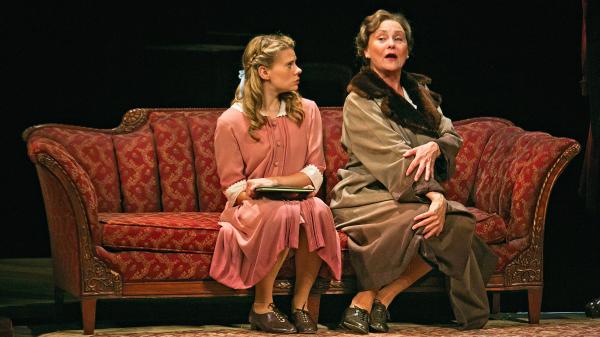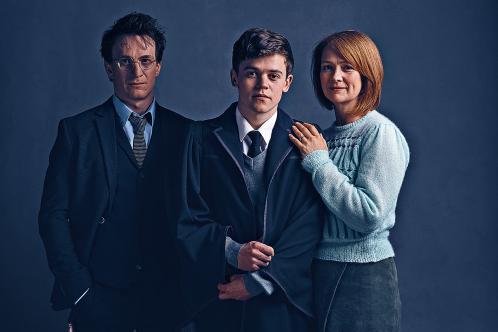John Tiffany interview
written for The Times, 21st July 2016

Celia Keenan-Bolger and Cherry Jones in The Glass Menagerie, directed by John Tiffany
Image credit: New York Times / Redux / eyevine
We don’t go in for celebrity theatre directors in Britain. Especially not if they look or sound like John Tiffany: bald, gangly, with an impish grin that bursts occasionally into a broad Yorkshire laugh.
If he is not yet stopped in the street for autographs, however, 44-year-old Tiffany is having quite a moment. After two years of development and an unprecedented seven weeks of previews, Harry Potter and the Cursed Child opens fully in London next week.
Meanwhile, Tiffany is already deep in rehearsals for his Edinburgh International Festival revival of Tennessee Williams’s The Glass Menagerie; the production was a critical hit on Broadway in 2013. When I meet him in a teeming studio space in south London, it’s the hottest day of the year. The dust of Williams’s Southern landscapes seems much closer than Hogwarts.
It came as a surprise to some that Tiffany was offered — and accepted — the job of steering the most commercial show in a decade. He made his name with angry, challenging work: first, Black Watch, a 2006 elegy for the eponymous Scottish regiment’s losses in Iraq; then the original production of Philip Ridley’s Mercury Fur, a dystopian vision of post-apocalyptic London in which resource-hoarders pay to sexually abuse and murder children.
Tiffany, naturally, has found a link from paedophilia to Potter. “They’re both about the healing power of love. And the perils of isolation. Isolation, alienation, disenfranchising people. Harry Potter is written from a moment of grief after Jo [JK Rowling]’s mum died, you know, so . . .” He makes the same link to Williams: “And Glass Menagerie is written from a moment of grief. And of guilt.”

Jamie Parker, Sam Clemmett and Poppy Miller in Harry Potter and the Cursed Child
Image credit: Charlie Gray
As a gently political writer, Rowling fascinates Tiffany. He was brought to the project two years ago by the mega-producer Sonia Friedman (another strong woman, like Tiffany’s directing mentor, the Royal Court’s artistic director Vicky Featherstone, to whom he is fiercely loyal), but Rowling and Tiffany go back years. “We always locked eyes, actually for months. I was literary manager at the Traverse Theatre in Edinburgh, and I was always running in and out of the bookshop, and I always saw this woman, using the café, writing. And I always used to wonder what she was writing. And now, I guess, I know.”
The Glass Menagerie is a more obvious — and guilty — homecoming for Tiffany. A crisis snapshot of the life of Tom, who watches his decayed Southern belle of a mother bully his fragile sister, it’s a play for anyone socially mobile who feels guilty about the people they left behind (Williams, who escaped to literary stardom, was unable to save his sister, who was forced to undergo a lobotomy in his absence).
When Tiffany was at Glasgow University, he switched from medicine under the influence of the Canadian director Robert Lepage, disappointing his mother. “I started doing theatre and classics and my tutor, a great man called Alasdair Cameron, gave it [The Glass Menagerie] to me and said, ‘I think this play will change your life.’ I thought, ‘That’s a big claim.’ And it did. The best play of the 20th century — I saw a run-through this morning and I was crying my eyes out.”
Tiffany, like Williams, is ambivalent about escaping his roots. “I was on a panel for Black Watch and I said I was working class. And my mum was upset with me because she said she worked to send me to university so I would never have to say I was working class. Although, as she says, ‘You can’t be working class and own a cafetiere.’ ”
Nor, I suspect, could he have stayed in Huddersfield and talked quite so comfortably about his boyfriend (in harsher times, Williams too escaped his home for the urban gay scene).
Tiffany’s star, Cherry Jones, who has already been Tony-nominated for her role as Tom’s mother, Amanda, also came to the play from a place of grief and guilt. Tiffany was introduced to her during a research fellowship at Harvard. “Cherry had just got out of Tennessee, where her mum and dad both had died. She’d been clearing out the house and she found some letters that her mum had written to her dad, and she slowly started talking about it in her Tennessee voice,” he says.
Tiffany was taken aback. “I’d seen her in Doubt [as a New York nun] and I had seen her as the president in 24. As she said herself, she’d always played New England spinsters.”
When she was eventually persuaded to take part in a reading at the New York Theatre Workshop, “Cherry arrived with the play: a first edition from her Southern grandmother, wrapped in a silk scarf. And when we finished it, she closed the last page and said, ‘When do we start?’ ”
Jones is the only actor to be transferring to Edinburgh from the Broadway run, which means heavy rehearsals with Michael Esper (who played Tom in the first New York read-through), Kate O’Flynn and Seth Numrich. Numrich plays the gentleman caller Jim, an accidental suitor who finds himself flung at Laura by her desperate mother. There’s something of the English comedy of manners, grown grotesque, in Williams’s play, but Tiffany is clearly revelling in the Americana of it all. “I was so excited because even if I did direct The Glass Menagerie I never thought I’d direct it with real American actors from the South.”
He has also teamed with the American composer Nico Muhly to provide incidental music. “He’s got that sense of minimalism, which we’re trying to do,” Tiffany says. “I’ve only got one piece of Laura’s actual glass menagerie, which is the unicorn, and there is no food visible. The play is Tom’s memories, and my sense of memory is that you only remember the important things.”
A future collaboration with Muhly and Tiffany’s long-term choreographer Steven Hoggett is on the cards, although the director is cagey about giving details. I suspect it won’t be an opera; Tiffany went to the Met’s Siegfried out of deference to Lepage’s direction, and “I was bored out of my mind. I’m not an opera fan at all.”
Perhaps that goes back to class again, to that residual sense of disenfranchisement. He’s angry again, today — about Brexit, about Theresa May (“terrifying because she’s competent”), about the Labour Party. He’s a passionate Remainer; get him going on the implications of Brexit and he speaks in lengthy, fluent monologues: “You know, I have a strong suspicion that my mum voted to leave. Because she would have thought she was doing that to save the NHS. She was a nurse for 40 years and that was the line that she was told, and I totally understand why she did it — because that’s what the people who run our country were telling her. She’s f***ed up my nephews’ futures and she thought she was saving them.”

John Tiffany’s previous work includes Black Watch and Mercury Fur
Image credit: Tony Rinaldo
He’s deeply depressed about the impact of Brexit on the arts; he discovered theatre during Glasgow’s year as the European Capital of Culture in 1990. “And as for the racism . . .” Working with Noma Dumezweni, the black actress taking on the role of Hermione Granger, he has had a front-row view of explicit racist abuse. “Noma’s just managing to handle it all with such dignity and I take my hat off to her, but it’s terrifying that people think they’ve got a right to do that,” Tiffany says.
He makes a connection between Dumezweni’s experience and the Brexit campaign: “It’s absolutely the same thing, this fear of the other, the outsider, the thing beyond your walls.”
David Cameron takes the bulk of the Brexit blame: “I listen to the Today programme every morning and I watch Question Time and I read newspapers every weekend — and I still didn’t feel qualified to vote. So if I felt like that, why on earth was I given a vote by David Cameron? He didn’t think for a second that this would happen. It was a popularity contest and he thought he could walk it. He led us into this mess, so I’m glad he’s gone.”
A long-term member of the Labour Party, Tiffany initially welcomed Jeremy Corbyn’s election last year: “I wondered if we could recalibrate the Labour Party and then allow someone to come up who could be a star — because he’s never going to win a general election, is he? But he’s a disaster. My mum’s never going to vote for someone who looks like he’s slept in his car. And I don’t think he’s taken what his job is seriously — he went on holiday during the Brexit campaign.”
Tiffany’s friend, the director Josie Rourke, helped to coach Ed Miliband for speeches — what would he do if he were asked to stage-manage Corbyn? “I’d give it up as a bad job.”
In political crisis, can theatre help? “Well, it’s kept me sane. It’s kept me and my team and my actors sane, but I don’t think it’s the answer. At best, I think we can provide wellbeing for participants; theatre with refugees, theatre with just all of us who are exhausted, but it’s not where I put my political energy — it’s not like going on a march or voting.”
Tiffany joined the anti-war marches in 2003 with Featherstone, her daughter on his shoulders. “She was born on 9/11, so she was two, sitting there on my shoulders. And I do think about her, and her future.”
Tiffany turns back to The Glass Menagerie. “It always felt prescient because it describes a world where in Spain there was Guernica, in America there was revolution brewing. And you realise actually we are at that point now. Whenever we’ve been at this place all that’s happened is war.”






